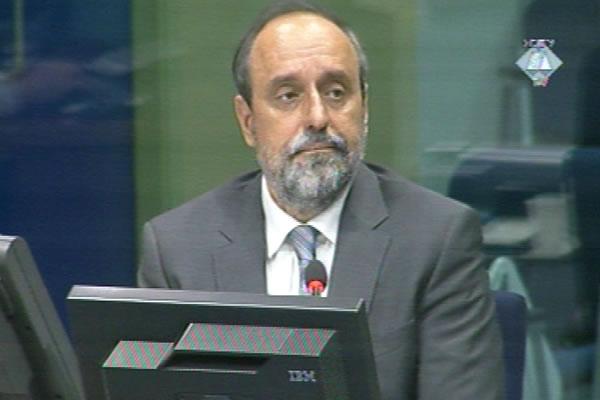Home
HADZIC: POLITICAL UNTRUTHS ARE NOT LIES
Former Serb political leader in Croatia Goran Hadzic contends that his statements were ‘statements made by a politician’; their purpose was to ‘increase [his] consequence’. ‘To exaggerate a situation or to misrepresent it’, Hadzic argued, ‘isn’t a lie’. According to the prosecution, Hadzic’s statements ‘incited violence and spread hatred’
 Goran Hadzic testify in his own defence
Goran Hadzic testify in his own defence According to the accused Goran Hadzic, the difference between what he said in 1991 before TV cameras and what he was saying now at the Tribunal is down to the political functions he had in Eastern Slavonia and in the Republic of Serbian Krajina during the war.
In a TV interview from the fall of 1991, played by the prosecution in court, Hadzic talks about the situation on the battlefield. Using the information he obtained from ‘our secret services’, Hadzic says that the Serbs in Slavonia held large parts of the territory of the Serb autonomous region including Baranja, parts of Western Srem and Osijek field. Hadzic goes on to say that the Serb forces would liberate Vukovar and calls on the able-bodied men and volunteers from Serbia to join the fighting. He also warns that there would be ‘no mercy for Croats who have blood on their hands’.
The prosecutor put it to Hadzic that he was well informed and that his information came from the political circles in Serbia. Today Hadzic said that he received information only from the Serb and Croat media and from refugees. The rest of his interview, including the reference to the Serb secret services simply ‘isn’t true’. When the prosecutor remarked that Hadzic lied either in the interview or in his testimony now, Hadzic told him he had made exaggerated political statements to ‘increase my consequence’. ‘You lie when you find it expedient. You have lied today to minimize the level of your involvement and the knowledge about the events’, the prosecutor put it to Hadzic. According to Hadzic, ‘it is not a lie if a situation is slightly exaggerated or misrepresented’.
The prosecutor suggested that Hadzic found it expedient to ‘spread hatred and incite violence’ to ‘set the stage’ for the events immediately after the fall of Vukovar on 18 November 1991. Three days later, about 200 persons were taken from the Vukovar Hospital and killed near the Ovcara farm. They were punished for ‘the blood on their hands’, the prosecutor quoted Hadzic’s own words from that period. Hadzic replied that he had ‘paltry previous political experience, from my time as the class president’. As he explained, he realized at the outset of his political career that ‘the goal can be accomplished only if in the beginning I appear to be siding’ with ‘the extremists’, in order to ‘prevent individuals from taking the law into their own hands’.
In late July 1991, Hadzic said in a statement to a Novi Sad TV network that Serbs were arming up and preparing for an offensive which would ‘prevent the re-establishment of the Ustasha rule’. Today Hadzic explained that in the summer of 1991 he gave about ten such statements; the goal was to ‘frighten’ the other side so that they would not shell Serb positions.
As the prosecutor alleged, this and similar statements laid the groundwork for the JNA attack on Dalj on 1 August 1991. Hadzic replied that he was not ‘as crazy and empty headed as all that’ to announce a military action on TV. The prosecutor noted that before the attack Hadzic had asked weapons from the JNA in Novi Sad. Hadzic explained that he went there to meet with the military authorities only to ‘make it seem as if I was doing something’. Hadzic will continue his evidence tomorrow.
Linked Reports
- Case : Hadzic
- 2014-08-25 SERB MAJORITY ACHIEVED BY MAKING NON-SERBS LEAVE AND SETTLING SERBS
- 2014-07-24 HADZIC’S ‘POLITICAL GAMES’
- 2014-07-23 DID PRIME MINISTER HADZIC HAVE ‘MINIMAL’ OR ‘SUBSTANTIAL’ POWERS?
- 2014-08-27 PRIORITIES SET BY HADZIC’S GOVERNMENT
- 2014-08-28 HADZIC WORE UNIFORM FOR REASONS OF HYGIENE
- 2014-09-01 DID HADZIC THREATEN OR PROTECT INVESTIGATOR?
